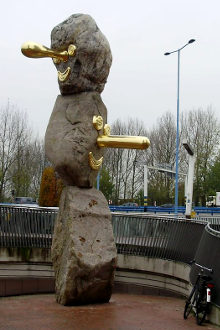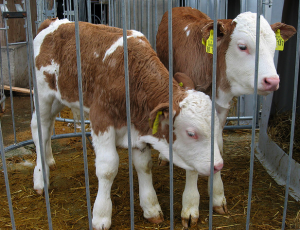 Quick, what is the world’s foremost potato exporting country? Yes, it’s the Netherlands, a country that exports almost twice the amount of potatoes it grows, leading France by just a few fries (which are Belgian anyway).
Quick, what is the world’s foremost potato exporting country? Yes, it’s the Netherlands, a country that exports almost twice the amount of potatoes it grows, leading France by just a few fries (which are Belgian anyway).
Enough of the FAOSTAT fueled statistics. Yesterday a Pieperboetiek (potato boutique) opened on the Jan Evertsenstraat in Amsterdam. Modern Farmer writes:
Between 26 September and 11 October, 25 tons of potatoes will parade through Amsterdam on big farm trucks. […] The pop-up will offer a wide and colourful variety of potatoes. “At first we were planning to have 30 types, but then some breeds got sick. So, it’s going to be 20 types,” says Felicia Alberding, a freelance journalist who is teaming up with potato farmers in organizing this event.
To make the pop-up more potato-y, there will naturally be an array of potato-related activities. The theatre team Superhallo will perform ‘Knol d’Amour’ which, they say, is both an ode to the potato and a delicious love story. The theatre makers will also host a fry potato party that lets people choose, peel and fry their own potatoes while they are playing music.
There will also be a tattoo artist who uses potato-based ink and both vodka and carrot-and-spinach tea are served, according to the store’s Facebook page.
The boutique was the idea of farmer Krispijn van den Dries from the Noordoostpolder area who wants to breed a better understanding between farmers and consumers. Felicia Alberding: “In most countries, farmers have become invisible over the past years. That anonymity is one of the reasons many people don’t value food and how it’s made any more.”
(Photo of De Aardappelmannetjes by Joost van den Toorn by Uair01, some rights reserved; this is a sculpture in Zoetermeer made from rocks and gilded bronze. It depicts two potato figures.)


 It must have been about 10 years ago, that I became aware of the difference in attitude towards food between Germans and Dutch. I was having dinner with a German friend, when she joked over a slice of quadruple-stranded DNA tomato, that the Dutch were a clever people, packaging sea water into little red bags and selling these ‘water bombs’ worldwide as tomatoes. My reply that apparently the world was stupid enough to buy said water bombs was less well received…
It must have been about 10 years ago, that I became aware of the difference in attitude towards food between Germans and Dutch. I was having dinner with a German friend, when she joked over a slice of quadruple-stranded DNA tomato, that the Dutch were a clever people, packaging sea water into little red bags and selling these ‘water bombs’ worldwide as tomatoes. My reply that apparently the world was stupid enough to buy said water bombs was less well received…